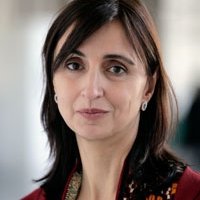Justice Iranian Style: Tehran's Extrajudicial Assassinations
Roya Hakakian, an Iranian-American poet, writer, and journalist, discussed the Mykonos Restaurant assassination of 1992, in Berlin in which three exiled Kurdish-Iranian opposition leaders were killed, and its effects on Iran’s relationship with the West, as well as the case’s impact on Iran’s extrajudicial assassination program.
On January 12, the Middle East Program hosted a book discussion of Hakakian’s latest book, Assassins of the Turquoise Palace. Haleh Esfandiari, Director of the Middle East Program at the Wilson Center, moderated the event.
To begin her talk, Hakakian recited a few jokes written by the contemporary Iranian satirist Hadi Khorsandi, whose epigraphs serve as an introduction to each chapter of her book. First, she described the result of the Mykonos Restaurant assassination that killed three members of the Democratic Party of Iranian Kurdistan (PDKI), rather than the assassination itself. She explained how the April 1997 landmark verdict reached by a German court was the first time the Iranian government had ever been implicated in the assassination of an exiled Iranian opposition leader, despite the fact that such murders had been occurring since the Iranian Revolution in 1979. In the aftermath of this conviction, all member states of the European Union withdrew their ambassadors, the first time such an event had occurred since 1979. Hakakian then stated that this withdrawal made the West safer for Iranian dissidents and others who were considered enemies of the regime, and Iran eventually agreed to suspend its assassinations abroad.
Returning to the assassination itself, Hakakian set up the events of September 17, 1992 in a restaurant in Berlin in which members of the Iranian opposition had gathered. Later that night, men with covered faces entered the restaurant and proceeded to kill three members of the Kurdish opposition as well as one other Iranian, their interpreter. Hakakian explained what made this case different from similar assassinations was what happened next. Assigned to the case was Bruno Jost, a German prosecutor who had previously investigated assassinations that had been the result of intra-Kurdish political power struggles. Hakakian describes a trip to Vienna that had convinced Jost that the murders in Germany were planned by the Iranian government, not other Kurdish groups, due to a similar set of murders in Austria three years earlier.
After the case was brought to trial in 1993, Hakakian showed the desperation of the Iranian government in attempting to prevent a verdict from being reached. One week before the case was to begin, Ali Fallahian, the Iranian Minister of Intelligence at the time, flew to Berlin to meet with his German counterpart, offering to set free a number of refugees in exchange for ending the trial. The speaker also described the Iranian government’s attempts to delay the trial, including constantly presenting new witnesses. However, near the end of 1996, one of Fallahian’s deputies defected from Iran and eventually found his way to Germany, where he testified and corroborated the testimony of the prosecution’s other witnesses, resulting in a conviction in April 1997, though the author also stated that the defector’s other allegations are not entirely accurate.
Aside from Iran’s promise to stop its assassinations abroad, Hakakian believed that the most important result of this case was a newfound willingness on the part of the Iranian media to investigate extrajudicial killings inside Iran. One other effect was decreased popularity for Akbar Hashemi Rafsanjani and the old guard of the Iranian Revolution, which then contributed to the election of Mohammed Khatami as president of Iran in June 1997.
By Daniel Magalotti, Middle East Program
Speaker

Writer and Journalist; New York Times Contributor
Hosted By

Middle East Program
The Wilson Center’s Middle East Program serves as a crucial resource for the policymaking community and beyond, providing analyses and research that helps inform US foreign policymaking, stimulates public debate, and expands knowledge about issues in the wider Middle East and North Africa (MENA) region. Read more

